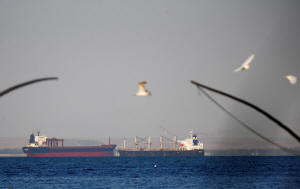Indian Navy picks up crew after ship hit off Yemen coast
 Send a link to a friend
Send a link to a friend
 [January 18, 2024]
By Krishn Kaushik, Idrees Ali and Phil Stewart [January 18, 2024]
By Krishn Kaushik, Idrees Ali and Phil Stewart
NEW DELHI/WASHINGTON (Reuters) -The Indian Navy said on Thursday it had
rescued the crew of a U.S.-owned vessel in the Gulf of Aden after an
attack by Yemen's Houthi movement as tensions in the region's sea lanes
disrupted global trade.
Following the attack on the U.S. Genco Picardy late on Wednesday, the
U.S. military said its forces had conducted strikes on 14 Houthi
missiles that "presented an imminent threat to merchant vessels and U.S.
Navy ships in the region".
Attacks by the Iran-allied Houthi militia on ships in and around the Red
Sea since November have slowed trade between Asia and Europe and alarmed
major powers in an escalation of the war between Israel and Palestinian
Hamas militants in Gaza.
The Houthis say they are acting in solidarity with Palestinians and have
threatened to target U.S. ships in response to American and British
strikes on the group's positions.
The strategy pursued by U.S. President Joe Biden - a blend of limited
military strikes and sanctions - appears aimed at preventing a wider
Middle East conflict even as Washington seeks to punish the Houthis,
security and military experts say.
But it is unclear whether it will accomplish Biden's main goal: halting
attacks by militants that are causing supply bottlenecks and raising
fears that inflation could reignite.
India had earlier diverted a warship deployed in the region to rescue
the 22 crew on board the Genco Picardy, including nine Indians. The crew
were all safe and a fire on board the vessel had been extinguished.

The Houthi movement said its missiles had made a "direct hit" on the
bulk carrier. Shipping operator Genco confirmed the attack, and said its
vessel was hit by a projectile while it was passing through the Gulf of
Aden with a cargo of phosphate rock.
TRADE FLOWS DISRUPTED
The attacks target a route that accounts for about 15% of the world's
shipping traffic and acts as a vital conduit between Europe and Asia.
[to top of second column]
|

Container ships cross the Gulf of Suez towards the Red Sea before
entering the Suez Canal, near Ismailia port city, northeast of
Cairo, Egypt, Egypt October 31, 2018. Picture taken October 31,
2018. REUTERS/Amr Abdallah Dalsh

The alternative shipping route around South Africa's Cape of Good
Hope can add 10-14 days to a journey compared to passage via the Red
Sea and the Suez Canal.
The crisis was rippling through the business world and reviving
concerns about stretched supply chains that emerged when activity
picked up after the COVID-19 pandemic.
War-hit Ukraine said the situation had led to a slowdown in its
agricultural exports this month. Pepco Group, the owner of the
Poundland group of discount retail stores, warned that its inventory
levels could be impacted.
The re-routing of a growing number of vessels is altering refuelling
patterns and boosting demand for bunker fuel used by ships at
far-flung ports, from Mauritius to South Africa to the Canary
Islands.
Denmark's Maersk and other large shipping lines have instructed
hundreds of commercial vessels to stay clear of the Red Sea, sending
them on the longer route around Africa or pausing until the safety
of vessels can be assured.
The attacks, as well as weather-related closures and stoppages in
Europe, were causing congestion at several container terminals,
Maersk told its customers on Thursday.
Italian ports are concerned that they are being bypassed as ships
steer away from the main Mediterranean route.
Freight rates have more than doubled since early December, according
to maritime consultancy Drewry's world container index, while
insurance sources say war risk premiums for shipments through the
Red Sea are also rising.
(Additional reporting by Jonathan Landay, Shivam Patel, Idrees Ali,
Simon Lewis, Pavel Polityuk, James Davey, Dan Williams, Terje
Solsvik, Jeslyn Lerh, Wendell Roelf and Robert Harvey Writing by
Keith Weir; Editing by Catherine Evans and Emelia Sithole-Matarise)
[© 2024 Thomson Reuters. All rights reserved.]This material
may not be published, broadcast, rewritten or redistributed.
Thompson Reuters is solely responsible for this content. |